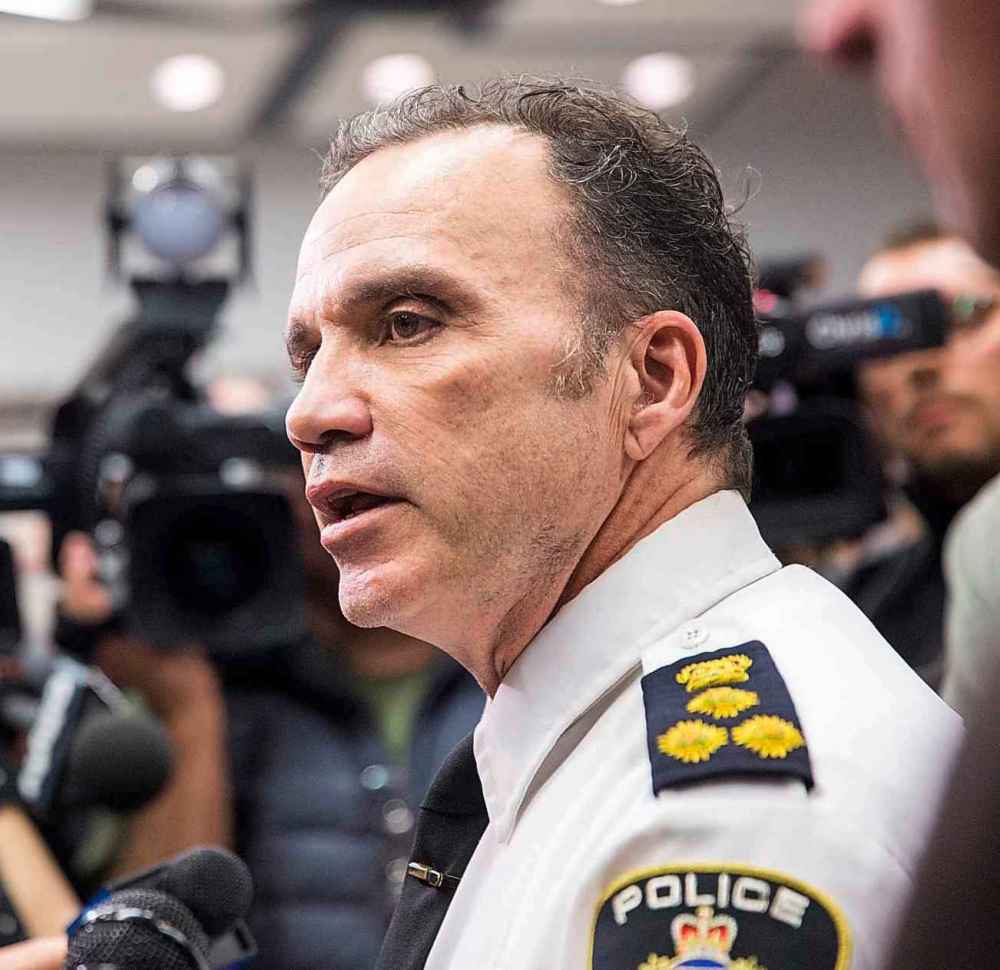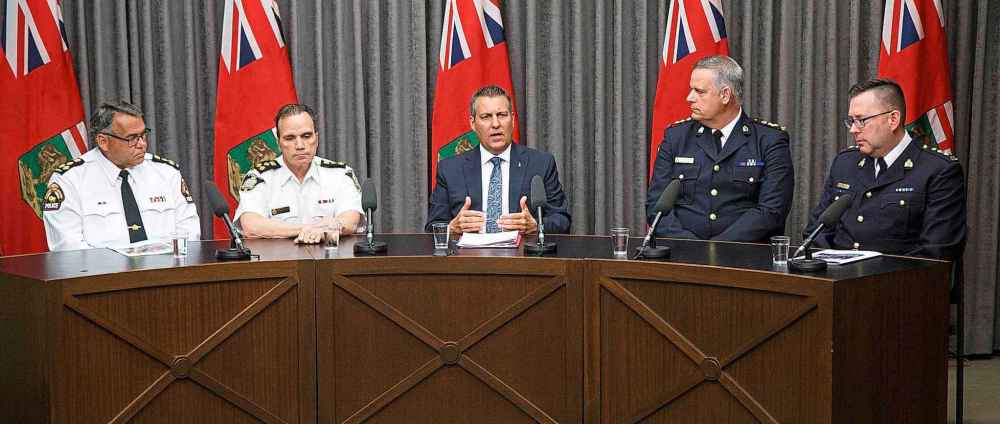Police chief seeks meth treatment commitment from province
Read this article for free:
or
Already have an account? Log in here »
To continue reading, please subscribe:
Monthly Digital Subscription
$19 $0 for the first 4 weeks*
- Enjoy unlimited reading on winnipegfreepress.com
- Read the E-Edition, our digital replica newspaper
- Access News Break, our award-winning app
- Play interactive puzzles
*No charge for 4 weeks then billed as $19 every four weeks (new subscribers and qualified returning subscribers only). Cancel anytime.
Read unlimited articles for free today:
or
Already have an account? Log in here »
Hey there, time traveller!
This article was published 17/07/2019 (1742 days ago), so information in it may no longer be current.
After telling his officers to “hang in there” despite increased workloads and low morale, Winnipeg’s police chief acknowledged members might make mistakes as fatigue sets in, noting they are responding to “unprecedented” numbers of service calls that often stem from drug- and alcohol-related crimes.
In an exclusive interview with the Free Press, Winnipeg Police Service chief Danny Smyth said Thursday the province’s inaction when it comes to developing treatment options for those grappling with methamphetamine addiction is affecting not just police, but Manitobans in general.

“I don’t think they’ve acted swiftly enough. But I think there’s a lot of good recommendations on the table and I would like to hear a commitment that some action is coming,” Smyth said after meeting with Justice Minister Cliff Cullen and other chiefs of police at the legislature.
“Most of the justice initiatives are already starting to be implemented, so I’m not frustrated on the justice side. We just have nowhere for the people struggling with addiction to help with their needs.”
Premier Brian Pallister also spoke to media Thursday, and noted the province is playing catch-up.
“We need to get better responses. Two years ago, it was the opioid crisis in Manitoba. Now, we’re talking meth and next year, it could be something else. And we can’t fail to respond more quickly to the circumstances that we must face,” the premier said.
“I think we need to act more quickly — not react, but to act quickly — in the future as we face these challenges. Every province has actually… said we need to be doing a better job of learning about best practices from each other, because we’re all facing similar situations.”
Smyth said he was “candid” during his roughly two-hour meeting with Cullen and leaders from the Brandon Police Service, Manitoba RCMP and Manitoba First Nations Police Service — as he was in his internal letter distributed to WPS members this week — talking about the health challenges police are encountering.

Smyth wasn’t prepared to say whether more boots on the ground are necessary to prevent officer fatigue and burnout.
“I’ve been largely status quo on our resources on the policing side, but it’s with the caveat that we’re holding the line until health (investment) catches up. The risk we run here if there’s inaction, bad things happen. People get tired. They make mistakes,” the WPS chief said.
“People make mistakes and it has implications in other areas, and we’re seeing that a little bit right now.”

Winnipeg police have had four officer-involved shootings thus far in 2019. Smyth described how those run-ins are also putting stress on members.
“Officer-involved shootings, in-custody deaths, these are things that are putting tremendous pressure on our people. It doesn’t mean they’ve done anything wrong, but it just puts more scrutiny on them,” he said. “And often, we’re dealing with people that are struggling with drugs and alcohol.”
Smyth said the amount of overtime police are putting in and the calls for service they’re receiving are “unprecedented.”
“We’re getting calls for service queues that are reaching the 400 threshold. I’ve been a cop for 33 years. I’ve never seen that before,” he said.
In separate interviews, neither Pallister nor Cullen would commit to any additional short-term investments. The premier noted planning for next year’s provincial budget is underway, and the government would “continue to entertain proposals in that respect.”
Smyth said he would have more to discuss about Winnipeg police’s workload at the release of its 2018 annual statistics report Monday.
Meanwhile, Winnipeg Police Board chairman Kevin Klein applauded Smyth for his frank letter to WPS members, noting it’s a sign of a strong leader willing to identify with concerns of the rank-and-file and hold governments to account.
“We hear at every police board event… people are angry about response times, they’re angry about the lack of visibility of police in their communities and they’re angry about the amount of crime. This does fall on all three levels of government,” the city councillor said.
He suggested the province needs to provide a secure area where people who are high on meth can be placed, which would be guarded by sheriffs, allowing police to return to work.
— with files from Aldo Santin
jessica.botelho@freepress.mb.ca
Twitter: @_jessbu
“Working their butts off”
Police across the province are “working their butts off” responding to a rise in methamphetamine use and associated crimes in Manitoba, according to the local RCMP commanding officer.
RCMP assistant commissioner Jane MacLatchy, Winnipeg Police Service Chief Danny Smyth, Brandon Police Service Chief Wayne Balcaen and Manitoba First Nations Police Service Insp. Bruno Rossi were all at the legislature Thursday in Winnipeg for the first formal group meeting with Justice Minister Cliff Cullen since the provincial policing and public safety strategy was unveiled in May.
“We all have the same challenges across the agencies, and I think the minister is really alive to those challenges as well,” MacLatchy said.
“I won’t speak to number of resources one way or the other, but what I can tell you is our front-line members are working their butts off every single day and, yeah, they’re getting tired in some cases. There’s no doubt,” she said.
“It doesn’t really matter whether you’re urban or rural or what have you, we’re seeing the meth situation there and it’s causing associated crimes.”
Smyth addressed increased workloads for city officers and decreased morale in their ranks in an all-staff letter sent to WPS members this week and later leaked to media.
Balcaen echoed some of Smyth’s concerns in an interview. He said while Brandon police haven’t been reporting higher rates of fatigue or burnout, they are still receiving increased volumes of calls for service.
“We’re seeing a change in the calls that we’re having, including a lot more fuelled by meth or illicit drugs,” he said.
“So we’ve been working with our regional health authority and with the province to have various institutional safety officers put in place to alleviate some of our workload… so that we can focus on the policing initiatives that are set out in the strategies there.”
Cullen described his meeting with the police leaders as “very positive,” said the roughly two-hour discussion was broad and touched on some issues raised in Smyth’s letter.
“I would say, they expressed their challenges and we talked about some ways we were addressing that. Certainly, a lot of our strategy is focused on reducing crime and public safety going forward,” the minister said.
“We did talk specifically about some of the initiatives we’ve taken through health. And there will be more initiatives through health, as well.”
jessica.botelho@freepress.mb.ca
Twitter: @_jessbu
History
Updated on Thursday, July 18, 2019 8:32 PM CDT: Adds sidebar














